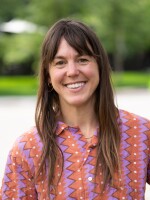Aspen resident Sallie Bernhard has a 37-year-old son with severe autism. He lives in his own house in Carbondale, but requires 24/7 oversight from caregivers.
Unlike in many urban areas, the Roaring Fork Valley offers little in the way of resources for adults like Bernard’s son and their families. Mountain Valley Developmental Services is the sole service provider in the region.
Bernard founded Ascendigo in 2004, a nonprofit providing services and support for individuals with autism and other intellectual and developmental disabilities. At a recent meeting in Carbondale, she was part of a team brainstorming local housing solutions for mentally disabled adults. .
The meeting was part of a statewide initiative to better understand how intentional or “neuro-diverse” communities offer another housing model that helps meet the needs of adults with cognitive disabilities.
Led by researcher Desiree Kameka Galloway, the Colorado Intentional Communities Research Project is investigating the kinds of policies needed to both encourage these communities and provide the oversight necessary to protect the individuals who would live there.
Galloway noted that intentional communities for people with mental disabilities are a fraught subject. Critics allege they lead to the kind of segregation and institutionalization that plagued the traditional group home mode. Proponents, meanwhile, say these communities offer residents greater autonomy and social integration.
Three of these communities exist on the Front Range, serving individuals with varying needs. They often include several types of housing, from private apartments to shared townhomes, and include common spaces for social activities and life-skills classes.
“The intent is that neighbors are going to know each other, and they're going to want to support each other,” said Galloway.
Previous surveys she’s done in parts of Colorado found that over half of adults with intellectual or developmental disabilities wanted to live in some form of intentional community.
At the meeting, one participant mentioned the benefits of having a built-in community for not only her child, but her son’s caregivers:
“When you have a profoundly disabled child who’s now a young adult, there are such limited options for you to get out and do things and be around people,” she said. “Our son's caregivers sit there and look at their phones all day when our son lived with us and we couldn't take him anywhere in the community. He played in the sink and I looked at my phone because you have no options.”
Ongoing challenges
At the federal and state level, affordable housing programs, like Low Income Housing Tax Credits and Section 8 vouchers, were not designed for adults with intellectual and cognitive disabilities. Instead, they target people with chronic homelessness and substance abuse issues.
That means it’s often difficult to secure financial support for a mentally disabled adult living in their parents’ home. “We don't want people to have to become homeless in order to access the housing subsidy,” said Galloway.
Rural areas, like the Roaring Fork Valley, face even more challenges. Ascendigo has tried to establish a year-round facility serving autistic children in Missouri Heights, but Garfield County Commissioners denied their proposal following months of protests from local residents.
“Twice we have closed in on a property and have been denied the ability to proceed,” said Bernhard, which she attributed to rural communities’ general “aversion” to any kind of density development.
For Galloway, the first step to surmounting these difficulties is building awareness around adults with cognitive disabilities.
“This is a population that's invisible,” she said. “Often, they live in family homes so they're not being counted as needing housing, particularly affordable, accessible housing.”
Galloway hopes her research will help establish a blueprint for more intentional communities throughout the state, including here in the Roaring Fork Valley.
That’s welcome news for Bernhard and the others currently struggling to care for adult children with disabilities.
Ultimately, she wants more housing options for people in her son’s situation. “We need it all,” Bernhard said.



